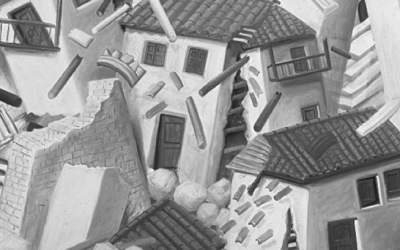Accountable to Whom?
Whom do Humanitarian Agencies Actually Work For?

Providing humanitarian aid in El Salvador, in the Guyana floods and in Venezuela. Photo courtesy of the Pan American Health Organization
The kid across the street falls off his bike, I go across and help him up, noticing he has cut his knee and it’s bleeding. I get the first-aid kit from the garage, clean the knee and put a plaster on it, and the boy, still biting his lip and trying not to cry, cycles up the road to his home on the other side of the block.
That was essentially small-scale humanitarian assistance. There was an emergency, an outsider responded in a timely fashion to provide immediate and appropriate assistance, the emergency ended and life went on. It never crossed my mind to think about whom I was accountable to or for what.
Cut to a border zone in Africa. Refugees are pouring across the borrder in this desolate semi-desert. An agency is rushing to set up a camp for 5,000 people. It wants to provide everything just right so it constructs a perimeter fence, pipes water to each prefab house, as well as electricity and all the works. However, the process takes so long that the refugees move on to another site, another agency.
Across the other side of the country drought has decimated the pastoralist population in a remote mountainous area: the same area where a suspected terrorist group has training camps. An aid agency has a plan to deliver individual sacks of food grain into the population using micro-light aircraft that can negotiate these mountainous areas. However, the aircraft will also be taking photographs of the valleys and passing these on to a “friend” who works for a security agency. And in the same area a small NGO is arguing with its donors that the decimated pastoralist community needs just so much water and so much food and the donor is arguing that they are used to living in desert conditions and can get by on far less than that. The country’s government is demanding that the aid agencies submit monthly reports of their work. The donors are demanding financial tracking, and the press guy from Fox News wants to know how much out of each dollar goes directly to the beneficiaries.
All of the above are real examples and all beg the questions, who is accountable, to whom, for what and why?
CHARITY OR PROFESSION?
The last 15 years have seen an explosion in the volume of humanitarian assistance around the world, including Latin America. Some would say that there has also been a political sea-change in the nature and purpose. Tracking through all these changes has been the question of accountability.
Why does accountability matter? After all humanitarian assistance is mostly carried out by not-for-profit organizations providing a service which simply would not be there if they did nothing. But, unlike the individual providing first aid to the kid who fell off the bike, aid agencies, whilst well intentioned, are specifically set up to take someone else’s money and pass it on in the form of a service to another group. The aid agency is entrusted with the resources of one group and trusted to do the right thing by the other. It is because of this trust that aid agencies absolutely have to be accountable.
ACCOUNTABLE TO WHOM AND FOR WHAT?
Agencies are essentially accountable for three things. They are accountable for delivering an appropriate and competent service. They are accountable for the trusteeship of the resources given to them, and they are accountable for acting according to a pre-agreed set of values or principles. This is essentially a description of what it means to be a profession. Think of medicine or law. There is a value set—the Hippocratic oath or client confidentiality. There is trusteeship of resources (no overcharging). There is the delivery of competent service (thus avoiding malpractice suits).
Aid agencies also have another accountability trait in common with doctors and lawyers. They are accountable to multiple groups. There is no ultimate share holder. They are accountable to those who provide funds (government, foundations, the general public); they are accountable to their peers since most relief operations require many agencies to work professionally together. They are accountable to future generations in that they have a responsibility to build and develop the competence of their profession and their organizations to deliver better service in the future. And of course, they are accountable to their clients/patients/beneficiaries.
TRUST
Aid agencies, particularly international ones, are often criticized, mostly by those on the right of the political spectrum, for being out of control or having no mandate. Humanitarian agencies are not elected to provide a service, critics say. They are not appointed by a recognized authority; they are not hired by the clients/beneficiaries. They are considered self appointed do-gooders playing God on the adventure holiday of a lifetime in someone else’s country – or so the caricature goes. By what right do these self appointed moralists act??
Of course the cornerstone of this critique is that you can truly divide the world up into them and us. But if your take is a cosmopolitan one that intrinsically values no human life over any other, then your right to provide a service from an aid agency based in Boston to a community in Colombia is no different from your right to cross over the street and tend to the suffering of the kid who fell off the bike. Your right to help each other is an essential part of what it is to be human. Because we can’t all help each disaster victim in the world individually, we entrust the aid agency to express and apply our humanity for us. That trust is why agencies have to be professional and accountable.
CODES, STANDARDS AND RISKS
As agencies have grown in size, public profile and professionalism they have developed a whole raft of accountability tools, codes and standards. Some of this has been driven by systemic changes in the way government agencies feel under increasing pressure to demonstrate accountability to the electorate, and pass on that responsibility to those to whom they give grants. Some of it is driving by a trend that seeks to instrumentalize NGOs in the humanitarian sector as implementers of foreign policy in crisis zones, and part of it is driven by agencies’ anxiety as they grow in size and realize that the old “charitable” way of doing business just does not cut it today.
In the past decade of so, humanitarian NGOs have come together globally to develop a code of conduct, a sort of ethical code on how they should behave when delivering assistance in someone else’s country (You can see a full copy of the Code athttp://ifrc.org/).
In the mid-90s, this process was taken a step further with the development of the Sphere standards. These global quality standards see humanitarian assistance, its delivery and acquisition, as a rights issue, derived from international humanitarian law, refugee law and the human rights conventions. The standards (with indicators) for the delivery of food, water, sanitation, shelter and heath-care have been translated into at least 20 languages, spawning a global network of trainers and courses aimed at helping agency staff program to these minimal standards ( See http://sphereproject.org)..
Going a step further an inter agency initiative styling itself the Humanitarian Accountability Project International (HAPI) has sought to develop standards for agencies to help them be more accountable to disaster victims (seehttp://hapinternational.org>..
All of these initiatives have increased agencies’ ability to deliver quality assistance and be accountable to the array of stakeholders to whom they are responsible: donors, professional peers, the victims of disaster.
SHORTCOMINGS OR DILUSIONS?
However, this decade-long push for standards and accountability is now showing some shortcomings.
Two big questions are beginning to emerge. First, in the pursuit of standards and accountability up the chain to donors, have the now trans-national NGOs lost their ability to craft evidence driven nuanced solutions to specific individual disasters? There is anecdotal evidence that the pressure to show success back to donors is causing a systematic skewing of agency reporting, hyping the positive, burying the negative. There is evidence that communities are getting the “agency model” solution, not the specifics of what they want or need. There is also evidence that agencies are becoming more risk- averse, going for yesterday’s solutions rather than innovation.
In some ways this is not unexpected. Many businesses, when they grow rapidly, become focused on standard and control, to the detriment of innovation and flexibility. The critical question though is, having recognized this phenomenon, can the humanitarian agencies address it and inject evidence-based risk-taking back into their programming, while still aiming to deliver to internationally acceptable standards?
The second big question concerns intent. In the politically charged environments of Iraq, Afghanistan, Sudan or Colombia, everywhere where the” war on terror” agenda, or the “global security through development” agenda is being pushed, have humanitarian agencies essentially give up on being independent, impartial, needs driven and become subsumed to the foreign policy agenda of the North? If they have, then they have in effect reneged on any pretense of being accountable to the victims of conflict and crisis. Neutrality flies out the window and political expedience allied to the long term big picture becomes the mantra. In Colombia, agencies find themselves often accused, by the North, of siding with insurgents, as they seek to align themselves with the poor and vulnerable. Again, neutrality, or at least the perception of neutrality, is called into question.
Both these questions—if answered in the affirmative— suggest a bleak future for accountable, independent evidence and needs driven humanitarian assistance. But, of course, it does not have to be that way. Agencies and staff in agencies do have a choice. They can go with the flow and become a subset of someone else’s agenda They can program “because we have always done it that way”, or they can reclaim their radical roots, putting accountability to the victims of disaster first and organizational imperatives second. The best will be both innovative and up to global standards, accountable to beneficiaries and to donors.
As Yogi Berra used to say: When you come to a fork in the road, take it.
Winter 2007, Volume VI, Number 2
Dr. Peter Walker is the director of the Feinstein International Center at Tufts University. and a member of the joint Tufts, Harvard, MIT Humanitarian Studies Initiative. http://www.humanitarianstudies.org/
Related Articles
Editor’s Letter: Natural Disasters
We were little black cats with white whiskers and long tails. One musical number from my one and only dance performance—in the fifth grade—has always stuck in my head. It was called “Hernando’s Hideaway,” a rhythm I was told was a tango from a faraway place called Argentina.
After the Earthquake: Juan’s Life
Juan was a construction helper. He lived in Armenia, but his parents were from the Antioquia region, who had fled because of the violence there. The mother of his children was called…
Political Memory
Late in 1717 Dr. Joseph Surin, precentor of the Cathedral of Old Guatemala, carried out some calculations: had the mudslide that wiped the city on the 28th of August, feast day of Saint…




